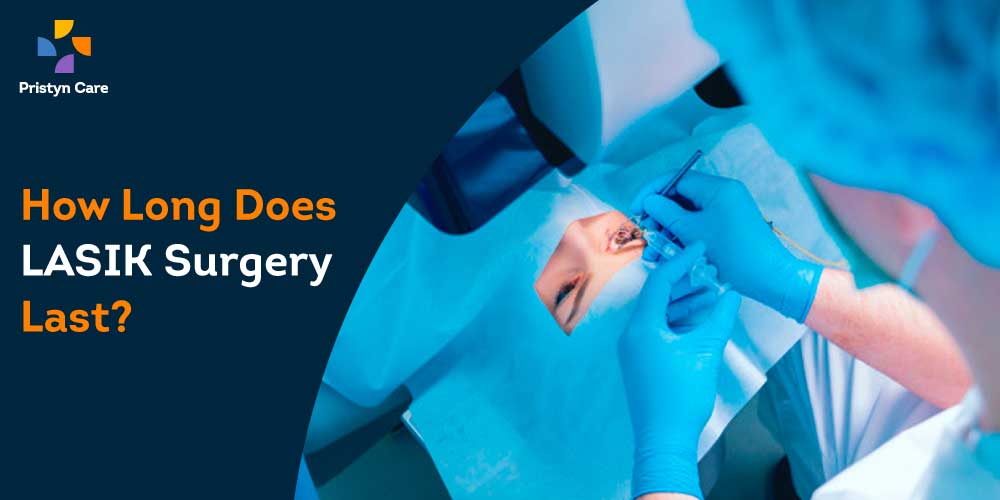
One of the most common myths about Lasik surgery is that the results of the surgery won’t last long. People assume that they will have to go through several procedures to maintain the results.
However, Lasik surgery is a permanent vision correction procedure. More than 90% of patients who have LASIK achieve 20/20 vision. This means they can see clearly from a distance of 20 feet away. Roughly around 99% of patients end up with 20/40 or better vision, which is clear enough to pass a driving test.
Table of Contents
What is Lasik Surgery?
Laser-assisted in situ keratomileusis or LASIK is a vision correction surgical procedure that treats:
- Myopia or nearsightedness : In this condition, your vision is sharp to see things nearby but it becomes blurry when you look at things at a distance.
- Hyperopia or farsightedness : In this condition, your vision is sharp enough to look at things far away but becomes hazy and blurred for nearby objects.
- Astigmatism: It is a condition that causes blurry vision because of imperfection in the shape of the cornea.
In this procedure, the doctor flattens the eye and cuts a flap to reshape the center of the cornea. Changing the shape of the tissue changes the way light focuses on the retina, resulting in a clearer vision/eyesight. However, it can take up to 6 months for eyes to reach its peak clarity. Lasik eye surgery is a very effective procedure with reliable results.
Does Lasik surgery last forever?
After the surgery, the shape of the cornea is likely to be stable for a long time. However, throughout one’s lifetime, the eyes can experience some natural changes that can hamper your vision.. The LASIK procedure can only fix vision problems that existed before the surgery but not after.
The Lasik enhancement procedure is a surgical procedure for those who have had lasik surgery before. With this surgery, even if the patient’s vision has deteriorated over time, corrections can be made to restore vision.
However, the need for LASIK-enhancing surgery is low, with only about 1 to 2 % of patients requiring it in the first year after LASIK. After that, the rate increases by about 1% per year. That is, after 5 years, about 5% of patients need enhancement to improve or maintain excellent vision.
What are the factors that affect your vision after Lasik Surgery?
- Cataracts
Cataracts are an aging-related change in the eye’s natural lens, which develops in the late 50’s and causes blurry, hazy or cloudy vision. Initially, your doctor might prescribe you correction glasses, and as the case worsens he/she may advise you to undergo cataract surgery, which will give you clear and sharp vision once again. Cataracts are not caused due to LASIK surgery, but cataracts inevitably develop when a person lives long enough.
- Presbyopia
When the natural crystalline lens of your eye begins to show signs of aging it is called presbyopia. During the lasik procedure, the lens is reshaped, but the lens behind the cornea hardens with the passage time. This means that the lens is no longer flexible enough to focus for both, far and near objects. This condition arises in the early 40s and usually the doctor recommends the use of bifocal glasses as its remedy.
LASIK eye surgery does not make presbyopia happen sooner, nor does it make the condition worse. LASIK can not prevent these changes to the eye. However, it offers an excellent vision correction procedure that gives freedom from glasses and contact lenses to those who are considered as a good candidate for the surgery.
- Myopia and Hyperopia
Nothing is guaranteed in a human body. Just as the prescription of your glasses changes naturally over a time period, a very small percentage of patients, sometimes after lasik surgery progress to nearsightedness or farsightedness. According to the American Refractive Surgery Council “ your vision deteriorates over time if the initial cause that affected the vision was either myopia or hyperopia”. To ensure this does not happen doctors advise to have a stable eyesight for at least a year or two before the surgery.
In case this still occurs, the patients can choose either to opt for LASIK enhancement surgery or other refractive surgery procedures depending on the condition of the eye.
- Diabetes
Blood sugar level fluctuates in people who are a diabetic patient. These can in turn cause fluctuations in eye power. Therefore LASIK surgery is not recommended to patients who have diabetes unless their blood sugar levels are strictly under control for the past few years.
- Hormonal Changes during pregnancy or breastfeeding
LASIK is contraindicated in pregnant women because of the hormonal changes associated with it. Doctors advise waiting for 6 to 12 months. With or without Lasik surgery, if necessary, the doctor recommends using prescription glasses. If the vision is not normal after some time, you may undergo an enhancement procedure.
How to ensure long term results of Lasik Surgery?
- Ophthalmologists advise lasik after at least 12 months of stable vision to minimize the need for LASIK enhancement procedure within a year of treatment. So in a hurry to get rid of the glasses do not modify and be accurate and honest for the duration your vision has been stable.
- After lasik surgery, annual eye checkups and exams are mandatory to ensure a healthy eye.
- Use lubricating eye drops recommended by the doctor to keep your eyes moisturized .
- Eat a healthy and balanced diet which includes all green vegetables, minerals and vitamins which are required by your body and most importantly in this case your eyes.
Still in dilemma? Book your appointments today at Pristyn Care. We offer you well experienced and trained ophthalmologists who will address all your queries and prescribe you the best treatment.







